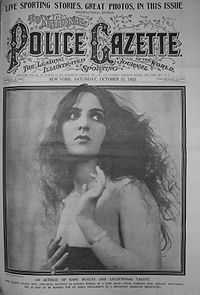National Police Gazette

The National Police Gazette, commonly referred to as simply the Police Gazette, was an American magazine founded in 1845 by two journalists, Enoch E. Camp, also an attorney, and George Wilkes, a transcontinental railroad booster.[1] In 1866, Wilkes and Camp sold the Gazette to George W. Matsell.[2][lower-alpha 1] The editor and proprietor from 1877 until his death in 1922 was Richard Kyle Fox, an immigrant from Ireland.
Ostensibly devoted to matters of interest to the police, it is a tabloid-like publication, with lurid coverage of murders, Wild West outlaws, and sport. It is well known for its engravings and photographs of scantily clad strippers, burlesque dancers, and prostitutes, often skirting on the edge of what is legally considered obscenity.
The National Police Gazette enjoyed considerable popularity in the late 19th century and early decades of the 20th century; but its popularity decreased during the Great Depression.[4] The National Police Gazette continued on after the death of Fox as a monthly publication for many years before ceasing print publication in 1977.
In its heyday it was immensely influential. In the first part of the 20th century, the United States became the centre for professional boxing. It was generally accepted that the "world champions" were those listed by the Police Gazette.[5] After 1920, the National Boxing Association began to sanction "title fights".
Frank Samuelsen and George Harbo
.jpg)
In 1896, the Police Gazette also offered a prize of $10,000 to the first to row across the Atlantic Ocean. In the same year, George Harbo and Frank Samuelsen invested their savings in an 18 foot rowboat, which they named 'Fox' after the editor of the gazette, Richard K. Fox. Despite crossing the Atlantic in 55 days (a record not broken until 2010, albeit by a team of four rowers) the Police Gazette never paid the men the promised prize money.
Entertainment coverage of the Vaudeville stage
On July 27, 1901 appeared as one of National Police Gazette headlines for reviews of popular entertainers, "Paragraphs of Interest Concerning the Stage Lives and Doings of Vaudeville People, Here can be Found Many Items Which Will Interest Performers as Well as Theater Goers, Professionals Requested to Send in Photos." On the list of favorably reviewed entertainers that included ventriloquists, minstrels, songsters, aerialists, and comedians was listed Pat H. Chappelle and his The Rabbit's Foot Company among other vaudeville shows. [6]
References
Explanatory notes
- ↑ Other sources state that Wilkes sold the Gazette shortly after his purchase of the The Spirit of the Times in 1856, and that Matsell was the publisher of the Gazette through the American Civil War.[3]
Citations
- ↑ Bain, David Haward (1999). Empire Express: Building the First Transcontinental Railroad. New York: Viking., pp. 32-33.
- ↑ Mott, Frank Luther (1938). A History of American Magazines 1741–1850. Cambridge, MA: Harvard University Press. pp. 328, 418 and footnote 132. OCLC 1893743.
- ↑ Betts, John Rickards (Spring 1953). "Sporting Journalism in Nineteenth-Century America". American Quarterly 5 (1): 42. JSTOR 3031289.
- ↑ American Heritage article, 1972
- ↑ Britannica. Police Gazette, Britannicaonline Online
- ↑ "Paragraphs of Interest of Vaudeville People Concerning the Stage ..." National Police Gazette, July 27, 1901.
External links
| Wikimedia Commons has media related to National Police Gazette. |
- National Police Gazette site, a homage to the Police Gazette's style in coverage of current events and contains some archival materials from the original publication.
- National Police Gazette archives (1844-1906 as of November 2014), at Fultonhistory.com